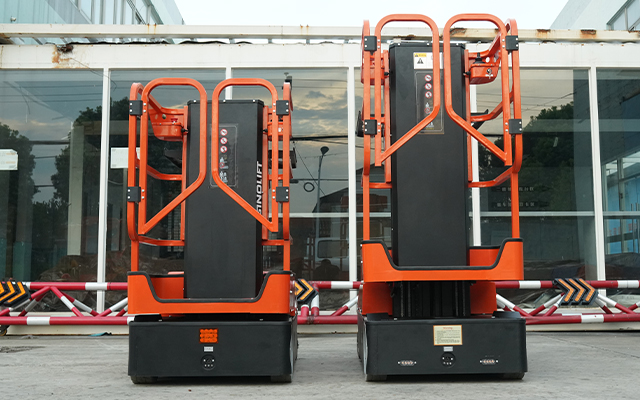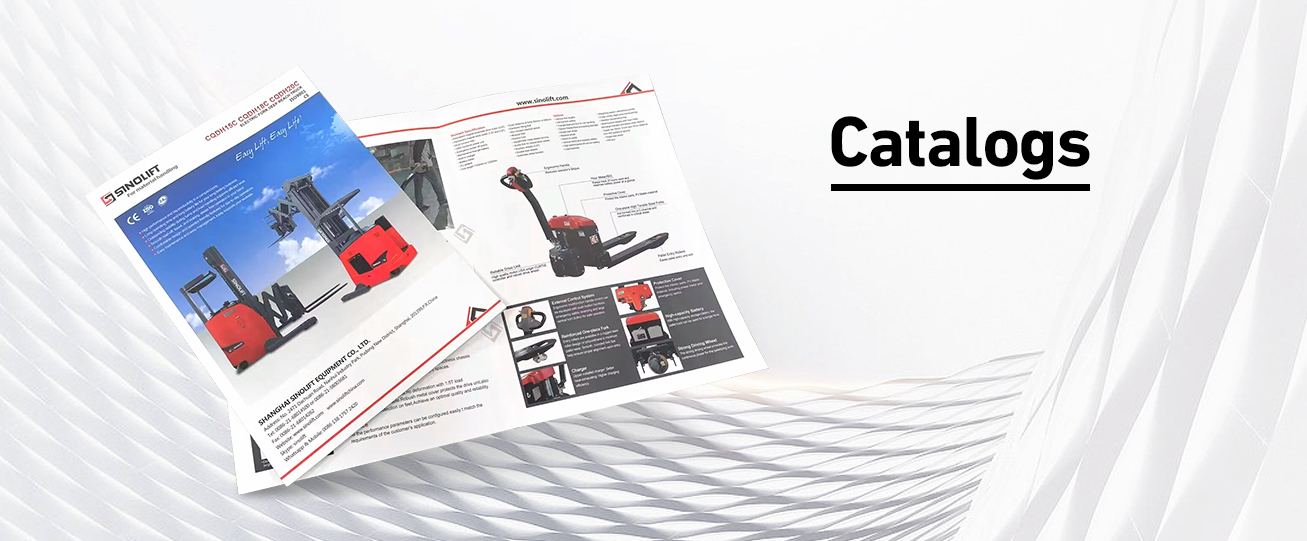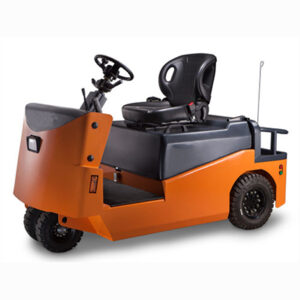1. Warehouse Forklift
warehouse-forklift
The warehouse forklift is the most recognizable type of lift truck. It resembles a golf cart with twin forks extending from the front. You’ll most often use this forklift in a facility with many items in inventory, as it’s great for loading and unloading pallets and transporting items to and from delivery vehicles.
Some of the most popular warehouse forklift models include the Hyster 36-38T, Komatsu 20 BX50 Hyster and the Toyota 3-Wheel Electric Forklift. Most industrial forklifts can lift 5,000 pounds of weight, but some heavy-duty models can elevate up to 25,000 pounds. Warehouse forklifts have a few subtypes, including side loaders and counterbalance forklifts.

Key Feature: Trucks have a loading capacity of 1-5 tons.
Uses: Best for raising and transporting items over short distances.
Explore Warehouse Forklifts
2. Side Loader
side-loader-forklift
A subtype of the warehouse forklift, side loaders are usually found in steel service centers and manufacturing facilities with heavy, long and bulky items such as pipes and lumber.
The operator stands in a sideways compartment while a side loader unloads objects. Due to its sideways operation, side loader forklifts can easily drive up alongside racks and load and unload without having to turn. This makes them suitable for navigating narrow aisles and handling long loads like timber and pipes.
Toyota, Raymond, Yale and Hyundai are some of the top brand manufacturers of side loaders.
Key Feature: Sideways compartment that moves in the direction of the load.
Uses: Lifting heavy, bulky and long items in tight spaces.
3. Counterbalance Forklift
counterbalance-forklift
The counterbalance forklift is a popular lift that features forks in the front and a weight in the back to counterbalance the weight of the load. Counterbalance forklifts have no extending arms, giving them the ability to move directly to the load.
There are a few different types of counterbalance forklifts. The 3-wheel variant is ideal for situations requiring the operator to turn and maneuver in circles, while a stand-up counterbalance forklift allows operators to easily hop on and off between loads. Popular manufacturers include Mitsubishi, Toyota and Crown.
Key Feature: Back-mounted weight that helps balance heavy loads.
Uses: Situations where tight 360-degree maneuvering is necessary.
4. Telehandler
telehandler
Also known as a telescopic forklift or a reach forklift, the telehandler is a combination of a crane and forklift with a boom and extendable arm. The twin forks attached to the arm are used to move pallets off the ground. A standard telehandler is capable of lifting 5,500 lbs of materials up to 19 feet in the air and is great for reaching into tight spaces and odd angles.
Because of their growing popularity, manufacturers like JCB, Genie, Bobcat, Haulotte and Caterpillar produce a variety of high-quality telehandlers. Models like the JLG 1644 are adept at larger capacity jobs, while other models can lift loads up to 55 feet high.
Key Feature: Extendable arm attachment and articulating boom.
Uses: Lifting loads off the ground to higher elevations.
Explore Telehandlers
5. Heavy-Duty Forklift
heavy-duty-forklift
The heavy-duty forklift — also called a large-capacity forklift — combines the functionalities of a warehouse forklift with a telehandler. While it can’t reach difficult angles the way a telehandler can, it can lift heavier loads much higher off the ground than a warehouse forklift. Smaller heavy-duty forklift starts with a 30,000-lb maximum lift, but you can find heavy-duty forklifts with a 100,000-lb maximum lift if such power is necessary.
There are 20 popular heavy-duty forklift manufacturers on the market. Big names include NACCO Industries and Mitsubishi, and some of the popular models boast an impressive capacity of 36,000 lbs.
Key Feature: Hydraulic levers combine a balance of reach and power.
Uses: Transporting heavy loads for industrial applications.
Explore Heavy-Duty Forklifts
6. Rough Terrain Forklift
rough-terrain-forklift
Also known as a straight mast forklift, the rough terrain forklift is designed specifically for outdoor job sites with uneven surfaces. These trucks have sturdy pneumatic tires that are oversized and threaded, giving them better balance and stability to safely transport materials on rocky ground. You likely won’t need one if you do most of your work indoors, but rough-terrain forklifts are a must for outdoor applications and construction sites.
Popular models include the JCB 950 and CASE 588H with four-wheel drive options. Another major perk of rough terrain forklifts is that they can lift heavier loads — most models have a capacity of 6,000 lbs or 8,000 lbs.
Key Feature: Sturdy design with oversized tires and a reinforced cage cab.
Uses: Outdoor jobs with uneven, rocky ground.
Explore Rough Terrain Forklifts
7. Pallet Jack
pallet-jack
Pallet jacks are specialized in nature. Also known as pump trucks, these pallet lifts aren’t capable of lifting large loads due to their small size. In exchange for power, pallet jacks have a small footprint, allowing them to fit into the tightest spaces and lift small loads in tight quarters. While you sacrifice power and maneuverability, a pallet jack’s acquisition and renting costs are much lower.
Popular pallet jack models include the Mighty Lift 20 x 36 Inch Pallet Truck and Vestil Electric Pallet Truck. Buyers or renters can choose between manual pallet jacks and electric pallet jacks.
Key Feature: Compact size, powered manually or occasionally with a battery.
Uses: Maneuvering small loads — like pallets — in tight spaces and over short distances.
Explore Pallet Jacks
8. Walkie Stacker
walkie-stacker
Walkie stackers are unique in appearance and specific in utility. Unlike other forklifts, these types of material-handling vehicles don’t have cabs. Instead, the operator walks behind the stacker and steers it by using an attached handle. These units lack power, maneuverability and speed but are ideal for situations where you need a taller pallet jack. The walkie stacker reaches much higher off the ground than traditional pallet jacks.
Current walkie stacker forklift manufacturers include Hyster, Jungheinrich and Toyota. Toyota’s 6BWC20 is ideal for 4,000-lb loads, while Jungheinrich’s EMC 110 is suited for narrow aisles. Key
Feature: Unique design requires the operator to walk behind the truck.
Uses: Maneuvering pallets to greater heights than is possible with a pallet jack.
Explore Walkie Stackers
9. Order Picker
order-picker
An order picker is a subtype of the walkie stacker operators use to pick and deliver materials from storage. Reaching up to 32 feet, these machines are designed to lift operators up to warehouse racks and carry individual units. They excel in customer order warehouses and storage facilities since they can pick individual units without having to bring down full pallets. Their versatile design means they can handle items of various sizes, from auto parts to furniture.
Key Feature: Open operator window and no pallet handling.
Uses: Piece-picking units and warehouse inventory applications.
10. Reach Fork Truck
reach-forklift
The reach forklift is a warehouse truck used mainly for indoor work. Its key ability is to extend its forks beyond the compartment and reach into warehouse racks in a way that standard forklifts cannot. It also features an open compartment that allows the operator to have greater visibility.
While excellent for indoor use, reach trucks are not suitable for outdoor work due to their minimal undercarriage clearance. UniCarriers, Clark Materials and Yale manufacture some of the most high-quality reach forklifts.
Key Feature: Stabilizing legs and forward-extending forks.
Uses: Quick and precise pallet picking in indoor environments.







